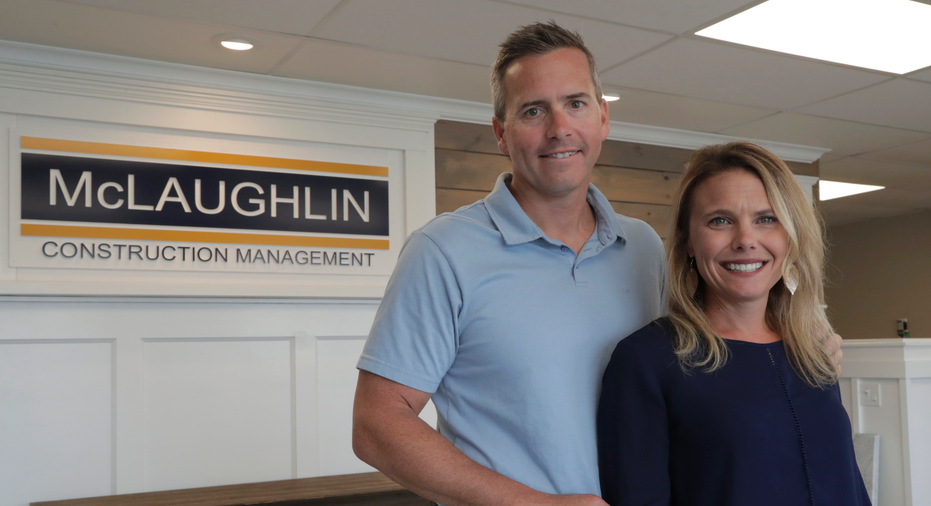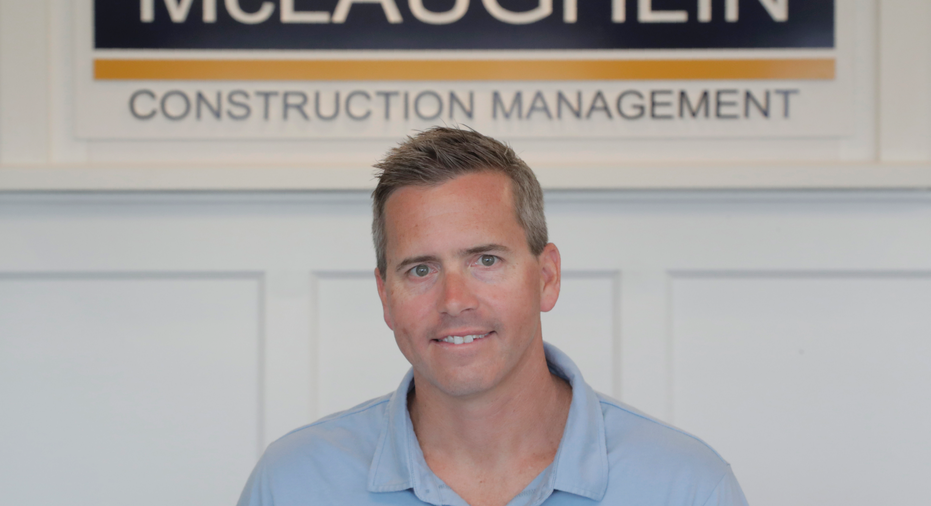Uncertainty can follow grief when small business owner dies
In this Wednesday, June 5, 2019, photo, Chris Carr, left, president of McLaughlin Construction Management, poses for a photo with his wife Kristy Carr in their office in Sea Isle City, N.J. When Kristy's father Jim McLaughlin died suddenly from a heart attack at age 64, his family assumed they would have to close his homebuilding business. But as McLaughlin’s son-in-law, Chris, started to wind down the Sea Isle City, New Jersey, company five years ago, he realized it was worth keeping open and that he, an accountant, should try to run it. (AP Photo/Julio Cortez)
NEW YORK – When Jim McLaughlin died suddenly from a heart attack at age 64, his family assumed they would have to close his homebuilding business. He'd made no plans for someone to succeed him at McLaughlin Construction, and there was no employee who could step in and take his place.
But as McLaughlin's son-in-law, Chris Carr, started to wind down the Sea Isle City, New Jersey, company five years ago, he realized it was worth keeping open and that he, an accountant, should try to run it.
"The main issue I had to deal with was, how in the world could we convince customers that it's a good idea to build a house with a guy who was an accountant 30 days before this," Carr says. Working with his wife Kristy, he also had to reassure employees and contractors worried about their livelihoods, and encourage them to stay with the company.
Many small business owners have no plans for what will happen to their companies when they die. The spouses, children or other relatives who step into the breach have to quickly learn the business, sometimes after sorting through haphazard records, and, as Carr did, try to win the confidence of staffers and vendors.
Surveys taken by banks and insurance companies in recent years found that most owners haven't created what's known as a succession plan that provides for who will own and run a business after the owner's death. But even those who have plans may not have written them or communicated them to anyone — including their chosen successors.
"They don't want to think about it," says Jillyn Hess-Verdon, an attorney based in Newport Beach, California, who does estate and succession planning. "Most of my clients spend more time planning a two-week vacation than they do the succession of a business."
At McLaughlin Construction, the transition was eased by the fact Jim McLaughlin kept good records. But as is the case at many small companies, he was the business; his personality and track record were what brought customers in. As Carr talked to employees and contractors, he got up to speed and ensured that the projects underway were completed. He then had to convince prospective customers he would deliver the same service and quality McLaughlin did. It took three years before he felt the business was back on the trajectory it had before McLaughlin's death.
Succession planning involves legal as well as practical issues, Hess-Verdon says. When there isn't a plan, family members can end up fighting over a company in court; the ensuing time, money spent and strife can distract from running the business. In partnerships, the battle can be between the family and the surviving partner or partners.
"It can be really damaging to the asset itself," Hess-Verdon says.
The business can also suffer when practical matters aren't dealt with before a death. For example, if the person or people who take over the company's operations need to be licensed and aren't, legally they're not allowed to be running the business, Hess-Verdon says.
There can be unpleasant surprises. When Randy Hansen was about to have a bone marrow transplant as he fought leukemia, he wrote down some basic information about his agricultural business and gave it to his wife, Sandy. Hansen thought he'd be OK, but three months later, in January 2003, he died at the age of 34. Soon after, his wife discovered that AgVenture Feed & Seed was close to bankruptcy; there was a bad farming economy at the time and Hansen had just bought out his former partner, burdening the Watkins, Minnesota, company with debt.
"He was a typical entrepreneur who didn't have a lot of policies written down," Sandy Hansen-Wolff recalls. "I feel like I went on a daily journey, getting through the day, handling my grief and also figuring the company out."
Hansen-Wolff found herself in difficult conversations with bankers and vendors about the company's financial position. She would hear third-hand that some suppliers publicly expressed doubts about her ability to keep the company going, saying, "she'll never be able to do it." As part of her learning curve, Hansen-Wolff developed a strategy of staying tough.
"I told them, 'either you are working with us or you are working against us,'" she says. After about a year, the company was turning around.
Trying to access online accounts including social media can be a nightmare for someone trying to keep a company going after the owner's death.
David Lyon owned a publishing business that he used to sell his own engineering books. When he suddenly died from a heart attack in December 2017, his daughter Jen took over Raven Publishing Co., based in Pittsfield, Massachusetts. While David Lyon had left a binder with some important information, it didn't include the password to his email. Soon after his death, his social media accounts were hacked and Jen Lyon couldn't respond to requests from readers.
"That's a lot of how he got business — people reached him on LinkedIn," she says.
There were other problems. She had to search through his computer files to understand issues like keeping copyrights going and renewing her father's business licenses. In order to keep marketing the books, she had to learn where he sold them, and what he did to advertise them.
"It's a matter of a lot detective work," she says. "I wish I had an opportunity to have a conversation with him before he passed away."
_____
Follow Joyce Rosenberg at www.twitter.com/JoyceMRosenberg . Her work can be found here: https://apnews.com .





















